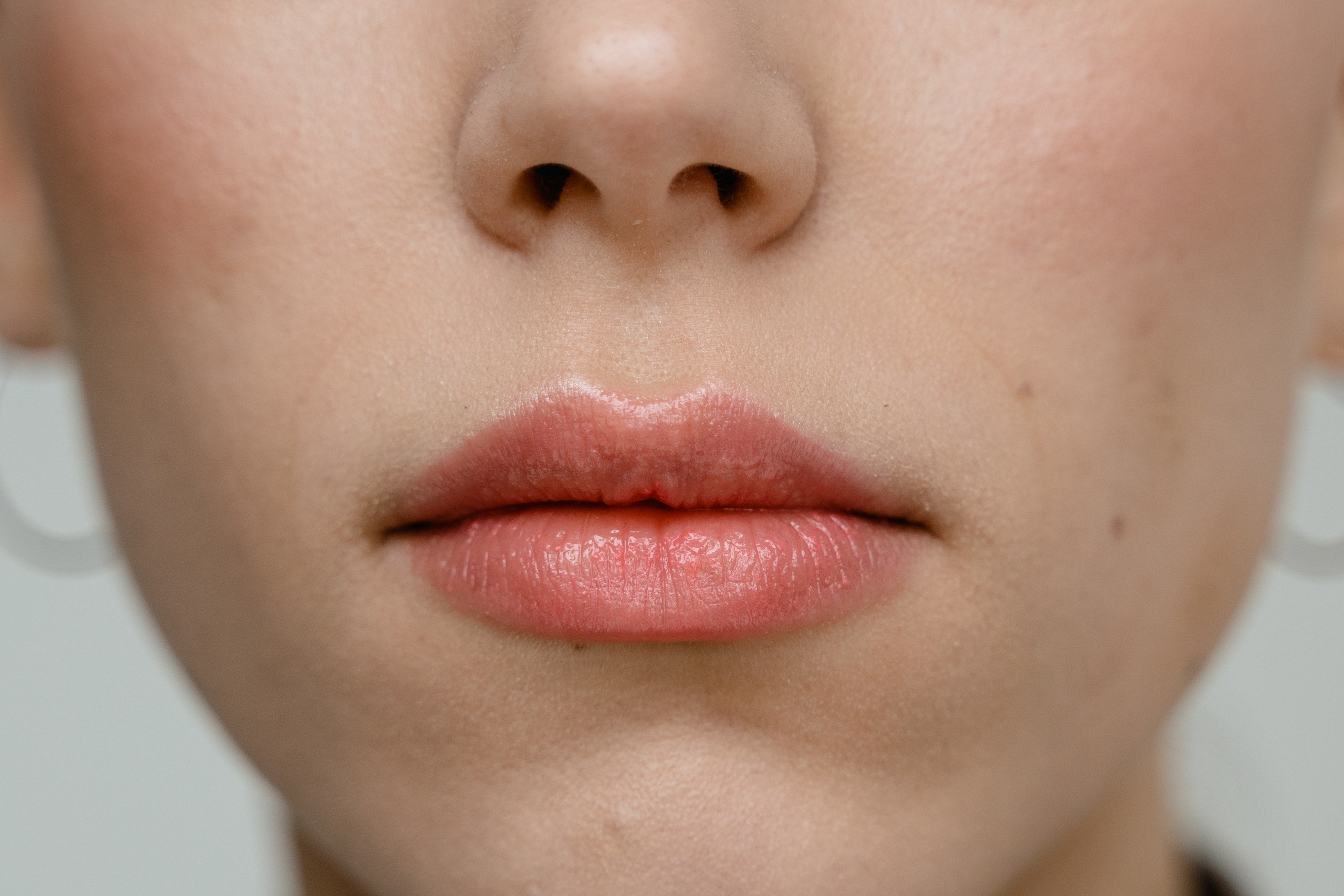
Acne Around Mouth: Holistic Approaches
Getting acne around your mouth can be embarrassing. There’s nothing worse than a breakout and not knowing the cause. Acne around the mouth can be a common skincare concern, affecting many individuals. We’ll explore the causes and solutions for acne specifically in this area. Whether you're dealing with occasional breakouts or persistent acne, understanding the factors at play can empower you to take control of your skincare routine.
What Does Acne Around the Mouth Mean?
Acne around the mouth can be attributed to various factors, and its presence may indicate different underlying issues. While face mapping and holistic approaches offer insights, it's important to note that acne is complex, and multiple factors can contribute to its development. Here are some potential causes of acne around the mouth:
- Hormonal Fluctuations: Hormonal changes, particularly in women, can contribute to acne around the mouth. Fluctuations in hormones, such as those occurring during the menstrual cycle, pregnancy, or menopause, may lead to increased oil production, resulting in acne.
- Diet and Nutrition: A diet high in processed foods, sugars, and dairy products can sometimes trigger acne around the mouth. Making dietary adjustments by reducing the consumption of these items and incorporating more fruits, vegetables, and whole grains may help.
- Skincare Products: Certain skincare and cosmetic products may contain ingredients that can clog pores or irritate the skin, leading to acne. Check the ingredients of your products, and consider using non-comedogenic options.
- Poor Oral Hygiene: Inadequate oral hygiene practices can contribute to acne around the mouth. Bacteria from the mouth can transfer to the skin, leading to the development of pimples. Regular brushing, flossing, and dental check-ups can help maintain oral health.
- Stress: Stress is known to exacerbate acne, and breakouts around the mouth may be linked to elevated stress levels. Practicing stress-reducing techniques, such as meditation or yoga, can be beneficial.
- Smoking: Smoking can contribute to acne around the mouth. The chemicals in cigarettes may irritate the skin, and the act of smoking can introduce toxins to the facial area.
- Digestive Issues: Problems with digestion or gut health can sometimes manifest as acne around the mouth. Ensuring a healthy gut through a balanced diet, probiotics, and hydration may positively impact the skin.
- Hormonal Conditions: Conditions like polycystic ovary syndrome (PCOS) or other hormonal disorders may contribute to acne around the mouth. Seeking medical advice and addressing underlying hormonal imbalances can be crucial in managing this type of acne.
If acne around the mouth is persistent or severe, it's advisable to consult with a dermatologist or healthcare professional. They can conduct a thorough examination, consider individual factors, and provide personalized recommendations for managing and treating acne effectively.
Common Causes of Mouth Acne
Acne around the mouth can be a bothersome and often persistent skin issue. Understanding the underlying causes is key to effective management and prevention. Here are some common factors that contribute to the development of acne in this specific area:
- Hormonal Fluctuations: Hormonal changes, especially during puberty, menstruation, and pregnancy, can contribute to the development of acne around the mouth. Increased androgen levels stimulate the sebaceous glands, leading to excess oil production, which can clog pores and result in acne.
- Poor Skincare Habits: Inadequate cleansing and skincare routines can allow dirt, oil, and dead skin cells to accumulate on the skin's surface. This buildup can contribute to the development of acne. Ensure a consistent and thorough skincare routine, including gentle cleansing and the use of non-comedogenic products.
- Dietary Factors: Certain foods may trigger acne around the mouth. High-glycemic foods, dairy products, and those high in saturated fats are known culprits. Paying attention to your diet and making healthier food choices can have a positive impact on skin health.
- Stress and Anxiety: Stress can manifest in various ways, and one common expression is through skin issues, including acne. Increased stress levels stimulate the release of hormones that can influence sebum production and inflammation, contributing to acne breakouts around the mouth.
- Touching and Picking: Constantly touching your face or picking at existing blemishes can introduce bacteria to the skin and worsen existing acne. It's essential to resist the temptation to touch or squeeze pimples, as this can lead to scarring and prolonged healing.
- Unsuitable Oral Care Products: Toothpaste and lip products containing certain ingredients, such as fluoride or heavy occlusive agents, may contribute to acne around the mouth. Be mindful of the products you use and consider switching to those labeled as non-comedogenic.
- Allergic Reactions: Allergic reactions to certain skincare products, toothpaste, or even food can result in acne-like eruptions around the mouth. Identify and eliminate potential allergens to alleviate skin issues.
Understanding the specific factors contributing to acne around the mouth allows for targeted prevention and treatment. If acne persists or worsens, consulting with a dermatologist can provide personalized insights and recommendations for effective management.

What Foods Cause Breakouts Around the Mouth?
Maintaining clear skin goes beyond skincare routines; it extends to what we eat. Certain foods are known to trigger breakouts around the mouth, exacerbating acne issues. Understanding these dietary factors can empower you to make informed choices for healthier skin. Here are some key culprits:
- High-Glycemic Foods: Foods with a high glycemic index can spike blood sugar levels, increasing insulin. This, in turn, may lead to higher sebum production and clogged pores, contributing to acne. Opt for whole grains, fruits, and vegetables with lower glycemic indices.
- Dairy Products: Dairy is a common culprit in acne breakouts. It contains hormones that can stimulate oil production and lead to clogged pores. Consider reducing your intake of milk, cheese, and other dairy products to see if it has a positive impact on your skin.
- Saturated Fats: Diets high in saturated fats, often found in fast food and processed snacks, can contribute to inflammation. Inflammation is a known factor in acne development. Choose healthier fats such as those found in avocados, nuts, and olive oil.
- Spicy Foods: Spicy foods may be enjoyable for many, but they can also be a trigger for acne around the mouth. Spices can irritate the skin and lead to inflammation. If you notice a correlation between spicy foods and breakouts, consider moderating your intake.
- Processed and Refined Foods: Processed and refined foods lack essential nutrients and may contain additives that can negatively impact skin health. Opt for a diet rich in whole, unprocessed foods to support overall well-being and skin vitality.
Understanding your body's response to different foods is crucial in managing acne around the mouth. Keep a food diary to track potential triggers.
How Do You Get Rid of Stress Acne Around Your Mouth?
Managing stress acne around the mouth involves a holistic approach that addresses both the external and internal factors contributing to skin issues. Here are some effective strategies to help alleviate and prevent stress-induced acne:
- Practice Stress-Reduction Techniques: Engage in mindfulness meditation to calm the mind and reduce stress levels. Practice deep breathing exercises to promote relaxation and alleviate stress. Regular physical activity can help manage stress and improve overall well-being.
- Establish a Consistent Skincare Routine: Use a mild, fragrance-free cleanser to cleanse your face twice a day to remove excess oil, dirt, and makeup. Choose skincare and makeup products labeled as non-comedogenic to avoid clogging pores. Use a lightweight moisturizer to keep the skin hydrated without causing excessive oiliness.
- Maintain a Healthy Diet: Drink plenty of water to keep the skin hydrated and promote overall health. Consume a diet rich in fruits, vegetables, whole grains, and lean proteins. Limit the intake of sugary and processed foods that can exacerbate acne.
- Get Adequate Sleep: Ensure you get enough quality sleep as inadequate sleep can contribute to stress and skin issues.
- Limit Caffeine and Stimulants: Excessive caffeine intake can contribute to stress. Consider reducing your consumption and opting for herbal teas or decaffeinated options.
- Avoid Touching and Picking: Refrain from touching your face, especially the acne-prone areas, to prevent the spread of bacteria and worsening of existing acne.
- Use Stress-Relief Activities: Engage in activities you enjoy, whether it's reading, listening to music, or spending time in nature. Hobbies and leisure activities can be effective stress relievers.
Remember, managing stress and acne is a gradual process. Implementing these strategies consistently can contribute to overall skin health and well-being.
How to Prevent Acne Breakouts Around the Mouth
Preventing acne breakouts around the mouth involves a combination of good skincare practices, a healthy lifestyle, and awareness of potential triggers.
Here's a comprehensive guide on how to prevent acne in this specific area:
- Maintain a Consistent Skincare Routine: Cleanse your face twice a day with a mild, fragrance-free cleanser to remove excess oil, dirt, and impurities. Choose skincare and makeup products labeled as non-comedogenic to avoid clogging pores. Use a lightweight moisturizer to keep the skin hydrated without contributing to excess oiliness.
- Be Mindful of Oral Care Products: Opt for toothpaste without potentially irritating ingredients like sodium lauryl sulfate or fluoride. Apply toothpaste before washing your face to avoid residue.
- Healthy Dietary Choices: Consume a diet rich in fruits, vegetables, whole grains, and lean proteins. Limit intake of high-glycemic foods, dairy, and saturated fats. Drink plenty of water to keep the skin hydrated and support overall health.
- Stress Management: Engage in stress-relief activities such as meditation, deep breathing exercises, yoga, or regular exercise. Ensure you get enough quality sleep, as lack of sleep can contribute to stress and skin issues.
- Hands-Off Policy: Avoid Touching and Picking: Refrain from touching your face, especially the mouth area, to prevent the spread of bacteria and minimize the risk of breakouts.
- Regular Exercise: Physical activity helps regulate hormones, reduces stress, and promotes overall well-being. Shower or cleanse your face after exercising to remove sweat and prevent pore clogging.
- Sun Protection: Use a broad-spectrum sunscreen with at least SPF 30 to protect your skin from harmful UV rays. Sun damage can worsen acne and cause inflammation.
- Watch for Allergies: Pay attention to any allergic reactions to skincare products, toothpaste, or certain foods. If you notice irritation, switch to hypoallergenic or fragrance-free options.
- Maintain Clean Personal Items: Regularly clean items that come into contact with your face, such as phone screens, pillowcases, and makeup brushes, to minimize the transfer of bacteria.
- Avoid Excessive Heat and Humidity: High temperatures and humidity can increase oil production. Keep your face cool and clean, especially during hot weather.
- Hygiene After Meals: After eating, wipe your mouth and chin area to remove any food residue that could potentially contribute to breakouts.
- Hormonal Balance: If hormonal fluctuations are a concern, discuss potential solutions with a healthcare professional.
By integrating these practices into your daily routine, you can significantly reduce the likelihood of acne breakouts around the mouth. Remember, consistency is key.






